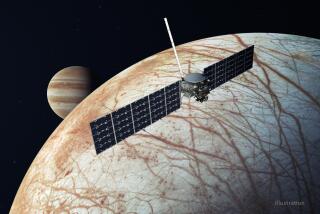Galileo May Put Europe Back in Orbit
- Share via
PARIS — A bust of Christopher Columbus stands proudly outside the office of the head of the European Space Agency, a reminder of Europe’s grand tradition of exploration and the riches it can bring.
Nowadays, space is the new frontier, and Europe has mostly ceded its trailblazing role to the powerful nation in the New World whose settlement Columbus initiated. But that doesn’t mean the treasure hunt is over.
European leaders are pushing ahead with commercial ventures to exploit outer space, despite sometimes blunt U.S. opposition with military overtones.
Having already snared half the global market for commercial space launches with its Ariane rockets, Europe is set to give the go-ahead for a $3-billion rival to the U.S.-run global positioning system.
A decision to release $392 million in development funds is expected at a meeting of European Union ministers in Brussels this month.
That would resuscitate Galileo, a project tied up for a year by money woes that recently came under attack by the Pentagon, which controls GPS and--some Europeans believe--is loath to lose its monopoly.
U.S. officials insist they’re not trying to dictate to Europe. They point out that GPS, which also is undergoing an upgrade, is already available worldwide--for free.
“The United States sees no compelling need for Galileo,” said Ralph Braibanti, the U.S. State Department official leading talks with the EU on the project.
Yet perceived attempts at U.S. interference may have helped rescue Galileo. Just as it seemed the plug was about to be pulled a few months ago on cost grounds, the debate shifted to geopolitics.
French President Jacques Chirac warned that Europe risked “vassal status” if it didn’t keep up in the space race.
EU Transport Commissioner Loyola de Palacio of Spain spoke of the dangers of others “calling the shots.”
“Is it essential for Europe that we have our strategic independence or not?” the head of the European Space Agency, Antonio Rodata, asked in an interview.
Germany had been the key holdout but finally decided to come on board in late February.
Swaying the cash-strapped German government was the “considerable political, strategic and economic importance” of Europe having its own system.
The European Space Agency, which is separate from the EU, was set up in 1975 with the express mission of helping Europe catch up with the U.S. and Soviet space programs. It has a long history of cooperation with NASA in scientific missions.
The agency provided the solar panels and one of the main instruments on the Hubble telescope, for example, and built a probe for NASA’s Cassini spacecraft en route now to Saturn.
But to remain competitive in the 21st century, Europe believes it must do more than just provide “bits and pieces” to NASA projects.
This month the space agency launched its own $2-billion Earth observation satellite to aid climate change research. It also was the originator of commercial moneymakers such as the Ariane launchers and Eutelsat, which produces communications satellites.
According to the agency, each euro of taxpayer money spent since the 1970s on the Ariane rockets has produced a three- or fourfold return on investment in the form of increased economic activity.
“It’s important that we master this technology to create opportunity in Europe,” Rodata said.
The space agency and the European Commission, the EU’s head office, announced plans for Galileo in 1999.
Private investment would help defray the cost of building and launching 30 satellites, backers say. With six more satellites than GPS, Galileo could provide added value and greater accuracy. Royalties from decoder chip sales and revenues from customers would start pouring in once the system is operational in 2008.
An independent study by PricewaterhouseCoopers saw the strongest commercial potential of Galileo in so-called location-based mobile technologies, where Europe already leads the United States. Such services allow cell phone users to track down the nearest pub, for example, or zero in on friends.
But the study also said EU governments probably would have to bear the costs of getting Galileo up and running.
That has worried some, notably Britain and the Netherlands, which managed to garner enough votes to postpone releasing development funds in December.
EU spokesman Gilles Gantelet dismisses such concerns as a pretext and instead blames unfair U.S. lobbying.
Shortly before the December vote, U.S. Deputy Secretary of Defense Paul Wolfowitz wrote EU colleagues questioning the “security ramifications for future NATO operations” if Galileo goes ahead.
His concern was that Galileo signals could interfere with the next-generation GPS signals intended for military use.
Galileo backers say such technical problems can be resolved. And although Galileo will not be operated by the military, as GPS is, they insist security concerns are not being ignored.
U.S. officials are less sure.
“There’s some tough issues that have to be worked out,” Braibanti, the State Department official, said from Washington. “The jury is still out as to whether a solid basis for cooperation still exists.”
More to Read
Sign up for Essential California
The most important California stories and recommendations in your inbox every morning.
You may occasionally receive promotional content from the Los Angeles Times.










